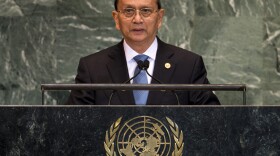
Maureen Pao
Maureen Pao is an editor, producer and reporter on NPR's Digital News team. In her current role, she is lead digital editor and producer for All Things Considered. Her primary responsibility is coordinating, producing and editing high-impact online components for complex, multipart show projects and host field reporting.
She also identifies and reports original stories for online, on-air and social platforms, on subjects ranging from childhood vaccinations during the pandemic, baby boxes and the high cost of childcare to Peppa Pig in China and the Underground Railroad in Maryland. Most memorable interview? No question: a one-on-one conversation with Dolly Parton.
In early 2020, Pao spent three months reporting local news at member station WAMU as part of an NPR exchange program. In 2014, she was chosen to participate in the East-West Center's Asia Pacific Journalism Fellowship program, during which she reported stories from Taiwan and Singapore.
Previously, she served as the first dedicated digital producer for international news at NPR.
Before coming to NPR, Pao worked as a travel editor at USA TODAY and as a reporter and editor in Hong Kong and Taiwan.
She's a graduate of the University of Virginia and earned a master's in journalism from the University of Michigan. Originally from South Carolina, she can drawl on command and talk about dumplings all day. She lives with her family in Washington, D.C.
-
A trade deal allowing Chinese investment in more service sectors was the provocation. But the real issue is Taiwan's sense that it's losing its identity and being overwhelmed by its powerful neighbor.
-
In pursuit of beauty, women around the globe subject themselves to complicated and bizarre, not to mention dangerous, procedures. In the West, that can mean going for darker skin. In Africa and parts of Asia, the opposite is the goal. Seriously, a sister just can't win.
-
Outrage in the U.S. over a French photo spread featuring a seductively arrayed 10-year-old model helped spur proposed legislation to ban child beauty pageants in France. That's ironic considering how popular, prevalent and lucrative the American child, or "glitz," beauty pageant industry is.
-
Levi's jeans made in Asia; Honda Civics made in America. What other iconic national products have pulled the old switcheroo?
-
Our commenters point out that the Middle East isn't the only place with confusing laws regulating the purchase and consumption of alcohol. Dry counties, wet counties, blue laws and mini-bottles: Jurisdictions across the U.S. also grapple with how to regulate alcohol sales.
-
For decades, millions of refugees around the world have lived in canvas tents. But those tents are hot during the day, cold at night, and afford little privacy. Ikea and the U.N. refugee agency are working to provide a durable and innovative alternative. Testing on the units begins this month in Ethiopia.
-
Turns out that a Renoir painting purchased for $7 in West Virginia wasn't just lost — it was stolen. Documents show it vanished from a Baltimore museum six decades ago. Its planned auction has been put on hold, and the FBI is investigating.
-
Myanmar President Thein Sein mentioned activist Aung San Suu Kyi during his speech at the U.N., believed to be the first time a Myanmar leader has done so. He laid out the country's democratic transformation so far, and addressed the sensitive subject of ethnic unrest in the Southeast Asian nation.
-
Forget four-leaf clovers, horseshoes and rabbit feet. The secret to the three-time-lottery-winning Oksnes family of Norway is simple: getting pregnant. In six years, three members of the family have won the national lottery — each coinciding with a birth.
-
Iranian President Mahmoud Ahmadinejad used his eighth appearance before the U.N. General Assembly to elaborate on his vision of a new world order and criticize what he calls the world's "hegemonic" and "expansionist" powers.










